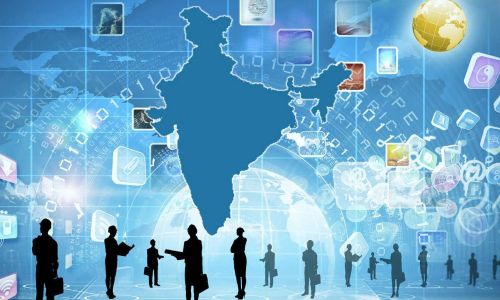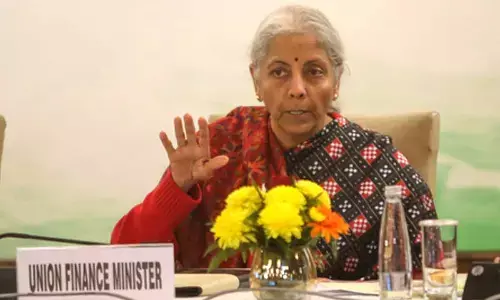Indian IT industry goes digital

Embracing disruptive technologies to stay ahead of the curve, the buoyant Indian IT industry made digital business its growth driver in 2018, despite facing a shortage of skills and doubledigit attrition
Embracing disruptive technologies to stay ahead of the curve, the buoyant Indian IT industry made digital business its growth driver in 2018, despite facing a shortage of skills and double-digit attrition.
"The Indian IT industry is reinventing for digital. India is seen as a country with huge digital transformation potential globally. Digital business is the next growth engine," K.S. Viswanathan, Vice President of Nasscom, the industry's apex body, told IANS here.
With digital business contributing over one-third of the revenue of global software majors like TCS, Infosys, Wipro and HCL Technologies, even mid-size and smaller firms have adopted digital platforms to meet the demand from customers worldwide.
"While larger firms have adopted digital and are mentioning revenue from it in their annual reports, mid-tier and smaller firms are also adopting it (disruptive technology), which augurs well for the services-led industry," Viswanathan noted.
Recovering from sluggish sequential growth in fiscal 2016-17 and 2017-18, the industry revved up this fiscal (2018-19) to meet the increasing demand for new services in the digital domain, spanning Artificial Intelligence (AI), automation, blockchain, Cloud, data analytics or mining, Internet of Things (IoT), machine learning (ML) and robotics.
"As per global trends, businesses have to be data-driven for efficient and competitive advantage. Digital technologies like AI and ML are key for enterprises to leverage data in smart ways," Srikanth Soundarajan, partner of city-based Venture East, told IANS.
Accounting for 37 per cent share of the global outsourcing of software services, the Indian IT-BPM (business process management) industry is set to post $167 billion revenue for fiscal 2018-19 from $154 billion in fiscal 2017-18, including exports, registering around eight per cent annual growth.
The resilient industry has been harnessing newer technologies and re-skilling to sustain growth and be competitive. It has been focusing on intelligent operations like process and domain expertise, while marquee firms made strategic acquisitions to arm with digital technology and skilled talent across platforms for diverse verticals.
"As digital technologies reshape businesses, the industry has been upskilling, acquiring competencies through mergers and acquisitions or partnerships and building platforms and software products," said Nasscom Vice Chairman Keshav R. Murugesh,
In the engineering and design ecosystem, too, many things are moving from services to products and products to platforms, thanks to digital innovation, talent pool and skill sets.
"Nasscom and the Indian government have signed an agreement with Japan this year to power its hardware with our software to make a difference to products," Vishwanathan recalled.
As the Indian IT industry dominates over 50 per cent of global IT outsourcing, vendors have been forced to invest in digital platforms and reskilling of their techies for the paradigm shift in their service offerings with digital interfaces.
With global tech firms like Accenture, IBM and Hewlett Packard Enterprises (HPE) taking the lead in global digital services, Indian behemoths have been investing and hiring to retain their legacy clients and enter new geographies to increase market share. With 17,000 firms across the country, the industry offers a range of services, having built skills and capabilities to address new and developing customer demands.
Over the years, IT firms have invested in building capabilities around new technologies, and have set up labs to deliver digital services to customers worldwide. "Businesses are taking advantage of emerging technologies like Robotic Process Automation (RPA), AI, digital communications, IoT and cognitive computing to improve profitability, collaboration and competitiveness," Murugesh noted. Digital innovation has also been drawing global firms to India owing to the wealth of talent to hone the new skills than cost arbitrage.
Around 45 per cent of global data centres are located in India, making the country a major destination for hosting them.
Admitting that there is a relevant skill shortage in the country to capitalise on the huge opportunities from digital platforms, Viswanathan said the industry would need around 300,000 engineers for analytics and data sciences over the next five years.
"Prime Minister Narendra Modi unveiled our programme called FutureSkills in February to reskill 50 per cent of the workforce for future technologies and get the remaining 50 per cent of them skilled for digital jobs," Vishwanathan recalled.
As hiring, skilling and re-skilling takes time and resources, top industry leaders made strategic acquisitions to meet the increasing demand for the new-age services. Bellwether Tata Consulting Services (TCS) acquired the London-based W12 Studios on November 1 for an unspecified amount to enhance its digital and design offerings.
Similarly, Infosys bought the US-based WongDoody studio for $75 million (Rs 525 crore) in May to provide digital services, while HCL Technologies took over the US-based Actian Corporation for $330 million (Rs 2,310 crore) in July. Wipro bought US-based design consultancy firm Cooper for $8.5 million (Rs 56 crore) in October 2017.
According to global research and advisory firm Gartner, discretionary spending by enterprises on digital platforms (Industry 4.0) have been more than in traditional and non-discretionary areas.
Though the attrition rate in the industry has reduced over the years, the trend has reversed in this fiscal for various reasons, including inability to adopt to newer technologies and not keeping pace with demand for reskilled techies.
- Fakir Balaji















